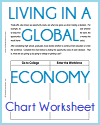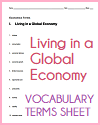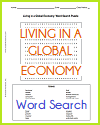| Living in a Global Economy |
| www.studenthandouts.com ↣ Social Studies ↣ Economics ↣ Living in a Global Economy |
 |
||||||||||
| Living in a Global Economy Energy Saver Game |
|
Maintaining economic fairness in the face of limited resources and unlimited wants is a complex challenge that requires careful consideration of economic, social, and political factors. While it may be impossible to completely eliminate disparities in wealth and resources under capitalism, societies can adopt various strategies and policies to promote greater economic fairness and reduce inequality. Here are some approaches. Progressive Taxation: Implementing a progressive tax system, where individuals with higher incomes pay a larger percentage of their income in taxes, can help redistribute wealth and fund essential public services. Progressive taxation can be used to finance social safety nets, education, healthcare, and other programs that benefit society's less privileged members. Social Safety Nets: Robust social safety net programs, such as unemployment benefits, food assistance, and housing support, can provide a safety net for individuals facing economic hardship. These programs help reduce poverty and provide a minimum standard of living. Minimum Wage: Establishing and periodically increasing a minimum wage that provides a living wage can help ensure that all workers earn a decent income. This policy can reduce income inequality by narrowing the gap between low-wage and high-wage workers. Worker Protections: Enforcing labor laws that protect workers' rights, such as fair wages, safe working conditions, and collective bargaining rights, can help workers secure better wages and benefits. Education and Training: Investing in education and workforce development programs can equip individuals with the skills and knowledge needed to access higher-paying job opportunities, reducing income inequality over the long term. Progressive Economic Policies: Implementing policies that promote economic growth with equity in mind can lead to more balanced outcomes. This includes fostering small business growth, encouraging the development of worker cooperatives, supporting entrepreneurship, increasing union participation, and ensuring that economic growth benefits a broad segment of the working class. Access to Healthcare: Ensuring affordable access to healthcare can prevent medical bills from pushing individuals and families into poverty. Universal healthcare systems or subsidies for low-income individuals can help achieve this goal. Wealth Redistribution: Implementing policies to tax wealth, capital gains, and inheritances can help redistribute wealth and reduce the concentration of assets among a small portion of the population. Financial Literacy Education: Promoting financial literacy and education can empower individuals to make informed financial decisions, save, invest, and manage their resources effectively. Community Development: Investing in economically disadvantaged communities through infrastructure development, job creation, and access to quality education can promote economic fairness at the local level. Antitrust Regulation: Enforcing antitrust laws to prevent monopolies and promote competition in markets can reduce economic inequality by preventing the undue concentration of economic power. Global Cooperation: Addressing global economic disparities requires international cooperation, including efforts to reduce trade imbalances, promote fair trade practices, and provide development aid to impoverished nations. Environmental Sustainability: Sustainable economic practices and policies that consider the environment can help ensure that future generations have access to vital resources and a stable economic foundation. It is important to recognize that achieving economic fairness is an ongoing process, and there is no one-size-fits-all solution. Balancing the competing goals of economic growth, individual liberty, and social equity requires thoughtful policy decisions, public dialogue, and adaptability to changing economic conditions. Additionally, achieving economic fairness often involves trade-offs and compromises, as different individuals and groups may have varying perspectives on what constitutes fairness. Therefore, democratic decision-making and engagement are essential in shaping economic policies that reflect the values and priorities of society as a whole. |
| www.studenthandouts.com ↣ Social Studies ↣ Economics ↣ Living in a Global Economy |













